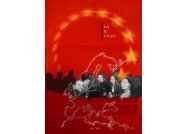turkish-greek civic dialogue - AEGEE Europe
turkish-greek civic dialogue - AEGEE Europe
turkish-greek civic dialogue - AEGEE Europe
You also want an ePaper? Increase the reach of your titles
YUMPU automatically turns print PDFs into web optimized ePapers that Google loves.
50<br />
identify the good and the bad. Strategic presentation of reliable information,<br />
so that it is politically usable for the ends desired, is often noted as the major<br />
strength of human rights organisations.<br />
In addition, monitoring the governments to keep them accountable to their<br />
previously stated policies and principles is another important strategy that civil<br />
society actors employ in relation to governments.<br />
HERCULES MILLAS<br />
We are too tight to accept some problems between Greece and Turkey,<br />
everything is not running smooth and let’s face we have some problems. I<br />
think the main problem and tension between Greeks and Turks is mistrust<br />
and lack of confidence. This creates a number of harmful and undesired<br />
attitudes. It’s not really correct to say we have lack of communication. Rarely<br />
any other nations in Balkans and in the world have had more communication<br />
than Turks and Greeks have had throughout the history. They lived together<br />
under the same state for hundreds of years and after. Therefore, they have had<br />
communication, they are very near; they have many things in common, same<br />
traditions, same food and music.<br />
We say we don’t have <strong>dialogue</strong>. No, that is not true; we have <strong>dialogue</strong><br />
amongst government officials and international fora. We discuss sometimes<br />
with the help of intermediaries, thus we have <strong>dialogue</strong>. Some people believe<br />
that <strong>dialogue</strong> is slow but it will solve the all problems automatically in time;<br />
however we saw in Cyprus issue where <strong>dialogue</strong> is in place but there is no<br />
solution at all. I think it’s not the <strong>dialogue</strong> to solve our problem. When we<br />
express ourselves we say only very little; we state that political problems<br />
do exist, such as Cyprus problem, regime problem, minority problem.<br />
However, we never say why political problems really exist and why we don’t<br />
solve them. This is the real question.<br />
Let’s take the minority problem, it is mainly a human rights problem and<br />
we cannot solve this problem. We still have intimidation and traditions. We<br />
still have the desire not to accept identities. Not all those problems require<br />
explanation, because this stubborn attitude not to solve simple problems has<br />
nothing to do with national interest, nothing to do with balance of powers.<br />
On the other hand, we have some sort of problems supposed to be directly<br />
connected to national interests. If we take the case of Cyprus, I still believe<br />
that we have a problem of democracy and human rights. For example, first the<br />
Greeks were deprived from their rights and separated their nation and then<br />
the Turks were persecuted, they were killed and deprived of their rights in<br />
their community. We see problems that cannot be easily explained by security<br />
measures or national interest and this is much more complex phenomenon.<br />
I believe behind of all this, there is a lack of confidence and fear creating<br />
this tension and does not let parties solve their problems. So-called conflict<br />
resolution measures or confidence building measures, which are relatively<br />
modern concepts of trying to solve problems, are very useful. We are here<br />
in such a process; we need all these psycho-analytic processes trying to<br />
understand what’s going on amongst us.<br />
There is a term introduced as a source of problems: “history of the nations”.<br />
I am not satisfied with that explanation. Because there is no such thing like<br />
history, there is only one thing that exists - historiographia (historiography).<br />
We don’t have a direct access to the history, we only talk about the history,<br />
the moment we start talking about history is actually the interpretation of<br />
history.<br />
We have two set of histories: the Greek history and the Turkish history. I can<br />
easily demonstrate that those histories are completely different.<br />
THE GREEKS USE ONE HISTORY AND TURKS USE ANOTHER HISTORY.<br />
If one day they happen to sit and discuss their problems each has their own<br />
agenda, each has their own interpretation; then we have a deadlock and<br />
they start a fight. This history is imaginary according to some text books, it’s<br />
not discovered but it’s invented, it’s created. It has a lot to do with national<br />
identity of each nation-state. When modern Turkey was established as a nationstate,<br />
they created a faculty called “dil- tarih - coğrafya fakültesi” (faculty<br />
of language-history-geography) and accordingly “tarih yazımı” (history writing)<br />
developed in Turkey. The same thing happened in Greece with historians writing<br />
history. They created a framework where “our” identity as well as “their”<br />
national identity can be accommodated. This is how we were all brought up<br />
with. Within this historical framework naturally we have created and we are<br />
reproducing everyday the “us” and “the Other”. For Turks, “the Other” is the<br />
Greeks and for the Greeks “the Other” is the Turks.<br />
Rebuilding Communication Association des Etats Généraux des Etudiants de L’<strong>Europe</strong>







